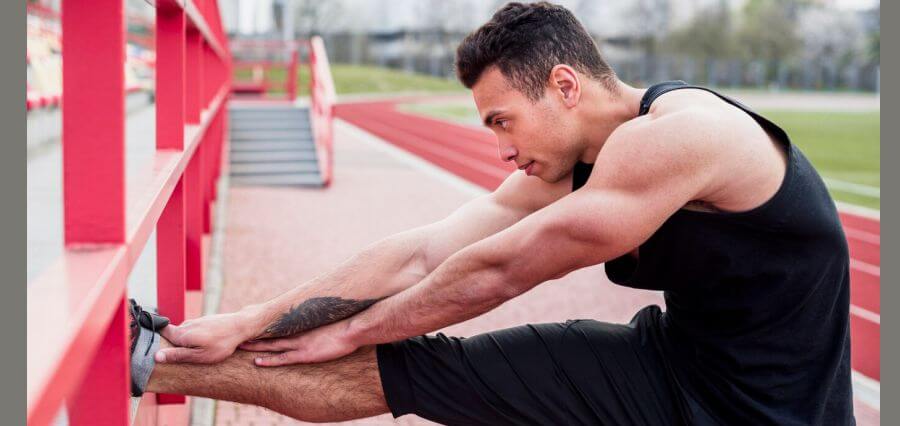For athletes to reach the highest level of game, they must do more than just training hard and eating well, they must sleep well too. The body will recover and be at its best when an athlete gets quality sleep that restores his or her energy levels.
According to a study conducted on eleven healthy students of Stanford University men’s varsity basketball team, there was a 9% improvement in free-throw and three-points accuracy attributed to proper sleep. This proves how crucial it is to maintain recovery and sleep for athletes.
Moving forward, this article will discuss some of the most effective ways for players to get a better sleep experience, thus enlightening them on how to improve performance, rest, as well as excel in their respective games.
Strategies For Improving Sleep Quality and Recovery
- Supplements for Better Sleep
Natural sleep aids are important to athletes who want to improve their sleeping habits. These will help them fall asleep faster and have a more comfortable sleep.
Natural Supplements for Sleep:
- Melatonin: A hormone that tells you when to wake up and when to sleep. When taken as a supplement, melatonin can adjust the internal clock of the body which is useful in situations like jet lags or dealing with inconsistent sleep schedules especially in an athlete’s life.
- Magnesium: This is a key mineral necessary for relaxation and de-stressing. The use of magnesium tablets can help improve the quality of your sleep as well as its duration.
- Valerian Root: A natural remedy known for its calming effects. Valerian root could be beneficial if you are struggling with how quickly you fall asleep or or the quality of your sleep.
- Chamomile: Tea made from chamomile which would calm you down allowing your brain and mind to settle down thus giving room for better sleep.
- L-Theanine: An amino acid present in tea leaves that produces a calming effect without causing drowsiness. It helps reduce anxiety thereby increasing relaxation and improving the quality of rest.
In case one wants something more specific, it would be very effective to go in for bodybuilding sleep aid. These supplements are created specifically for athletes so as to facilitate optimum sleeping and recuperation periods.
In the end, athletes should consult with healthcare before starting any supplement regimen to ensure safety.
- Evaluate The Sleeping Surroundings
Creating a perfect environment is the first step toward better sleep quality for an athlete. A suitable sleeping area can have a great impact on how well you sleep as well as how refreshed you wake up.
Tips On Creating An Optimal Sleep Environment:
- Keep your Bedroom Cool, Dark And Quiet:
- Blackout curtains can make your room dark enough throughout the night which is important in melatonin production.
- White noise machines or earplugs can help reduce interruptions from external noises leading to more consistent restful sleep.
- Maintain the temperature between 60-67°F (15-19°C) because cold temperatures cool down body temperature promoting natural sleep.
- Minimize Distractions:
- Remove electronic devices from the bedroom. The light emitted from screens can disrupt your body’s internal clock.
- Promote relaxation by creating a clutter-free space. Stress can be reduced and sleep improved through a neat, organized setting.
According to the National Sleep Foundation, “Optimizing the sleep environment is a basic step given the crucial nature of sleep in athletic performance.”
- Establish a Consistent Sleep Routine
Creating a conducive sleep environment is important but when matched with a consistent sleep routine, it maximizes the benefits. It helps regulate your body’s internal clock which promotes better sleep generally.
Steps to Establishing a Consistent Sleep Routine:
- Go to Bed and Wake Up at the Same Time Every Day:
- Consistently keeping to the same bedtime schedule, even during weekends enhances the maintenance of the body’s internal clock.
- Develop a Pre-Sleep Routine:
- Engage in relaxing activities such as reading or having a warm bath. This signals your body to wind down.
- Avoid electronics for at least one hour before bed since this reduces exposure to blue light which suppresses melatonin production and delays the time taken to fall asleep.
- Create a Relaxing Pre-bedtime Ritual:
- Do mindfulness or relaxation yoga to clear your mind and relax your body.
- You can also listen to calming music or nature sounds to lull yourself into sleep.
- Hydration and Nutrition
In addition to sleep-specific strategies, proper hydration and nutrition are critical for overall recovery and sleep. Thus, your diet can be your best natural sleep aid.
Hydration and Nutrition Tips:
- Stay Hydrated Throughout the Day:
- Proper hydration makes one’s sleep quality better. Dehydration causes dryness in the mouth and nasal passages leading to discomfort as well as sleep disruption.
- Avoid Heavy Meals, Caffeine, and Alcohol Close to Bedtime:
- Having heavy meals might cause discomfort hence making it difficult for you to fall asleep. Similarly, caffeine and alcohol will affect your sleeping cycle. Caffeine is a stimulant that may keep you awake while alcohol, despite making you feel drowsy interferes with your quality of sleep.
- Include Sleep-Promoting Foods:
- Tryptophan-rich foods such as turkey, pumpkin seeds, and cherries enhance the quality of sleep. Tryptophan is an amino acid needed by serotonin synthesis which later becomes melatonin, a hormone that regulates the sleep-wake cycle.
- Melatonin-rich foods like cherries and kiwifruit can also aid in bettering sleep patterns.
- Control and Modify Training Load
In addition, the recovery can be advanced by monitoring training loads using recovery measures such as heart rate variability (HRV). HRV will result in smarter decisions regarding training hence better recovery.
To better understand this, a study that focused on road cyclists shows that HRV-guided training led to substantial increase in peak power, around 5%, for a specified group of cyclists. This shows the positive impact of HRV.
Monitoring and Adjusting Training Load:
- Monitor Heart Rate Variability (HRV):
- The autonomic nervous system of the body is linked to HRV, which measures the variation in time between heartbeats. Typically, high HRV implies improved recovery and readiness.
- Use wearable technology to monitor your HRV and adjust your training intensity and duration accordingly.
- Adjust Training Schedules:
- Optimal performance and recovery come when you align training blocks with high HRVs. If an athlete’s HRV is low on a given day, decrease either the duration or intensity of workouts to avoid overtraining and promote recovery.
By relying on data from HRV one can ensure that training intensity is matched to the athlete’s level of recovery thus warding off symptoms of overtraining while enhancing sustainable performance development.
- Cold and Heat Treatments
Part of sleep and training adjustments is to use cold and heat treatment. These therapies are known to reduce inflammations in the body as well as improving your sleep quality.
Tips for Cold and Heat Therapy:
- Cold-Water Immersion:
- It involves submersion of one’s body in cold water which helps in reducing muscle soreness and inflammation thus hastening recovery.
- For those athletes who may wish to recover fast after training, they should try to have a cold shower or ice bath.
- Warm Baths or Showers Before Bed:
- Warm baths or showers before bed lowers the core body temperature, signaling the brain that it’s time to sleep.
- At any point after taking a warm bath, there is a cooling down effect whereby it promotes natural decline in body temperature needed for onset of sleep.
To know more about these two therapies, refer to the comparison table below to decide the one that suits for you:
| Feature | Cold Therapy (Cryotherapy) | Hot Therapy (Heat Therapy) |
| Primary Purpose | Reduces inflammation and numbs pain | Relaxes and soothes muscles, increases blood flow |
| When to Use | Immediately after an injury or physical activity | After the initial swelling has gone down |
| Common Uses | Sprains, strains, bruises, acute injuries | Muscle soreness, stiffness, chronic pain |
| Method | Ice packs, cold compresses, ice baths, cryo chambers | Heating pads, warm baths, heat wraps, warm compresses |
| Duration | 10-20 minutes per session, multiple times a day | 15-30 minutes per session, as needed |
| Effect on Blood Flow | Decreases blood flow to reduce swelling | Increases blood flow to promote healing |
| Contraindications | Not suitable for people with circulatory issues or hypersensitivity to cold | Not suitable for acute injuries or people with conditions aggravated by heat |
- Mental and Cognitive Recovery Strategies
Equally essential is the mental and cognitive aspects of the recovery process that ensures holistic wellness. Sleep helps with emotional regulation, and cognitive functioning that are critical for peak performance.
Addressing the issue of mental and cognitive recovery is important as far as holistic athletic performance is concerned. Striking a balance between physical and psychological healing guarantees athletes’ readiness for both the physical and psychological requirements of their game.
FAQs
Q: How many hours of sleep do athletes require?
A: Athletes should try to get 7-9 hours of quality sleep every night. Sleep is an important part of healing for athletes since it is when the body repairs and grows significantly. Sometimes, for elite athletes who train intensively and are under a lot of physical stress, they may extend their sleep to about 10 hours per night. The benefits of increasing sleep period include:
- Enhancing Muscle Recovery
- Improving Performance
- Increasing Immune Functioning
- Improving Cognitive Skills
Q: What are the best foods that one can eat before bed to improve sleep quality?
A: Nutrition plays a big role in helping people to experience a good night’s rest. There are certain foods that can be eaten prior to going to bed to improve latency as well as quality of sleep. Some food substances that promote better sleep are:
- Foods High in Tryptophan: Tryptophan is an amino acid used by the body to produce serotonin, which then turns into melatonin, the hormone responsible for regulating sleep.
- Melatonin Rich Foods: Certain foods such as cherries and kiwifruit contain melatonin which helps regulate our internal clock for proper functioning.
- Complex Carbohydrates: Complex carbs such as whole grains and cereals have been shown to boost serotonin levels which promotes healthier sleeping patterns.
Q: What types of foods could lower my sleep quality?
Different kinds of food and drinks can impede your ability to get into deep sleep. It can happen when you consume:
- Caffeinated foodstuffs or beverages: For instance, coffee or tea as well as chocolate and energy drinks contain caffeine that prevents you from sleeping.
- Spicy meals: Those ones consisting of much pepper can provoke dyspepsia and cause some inconvenient feelings while going to bed.
- Fatty products: They cause indigestion and uneasiness, which can break a perfect sleep.
- Sweetened foods and refreshments: Increased sugar intake results in energy fluctuation which mess up your sleep rhythm. Thus, avoid excessive consumption of candies, softdrinks, juices, etc.
Read More: Click Here










